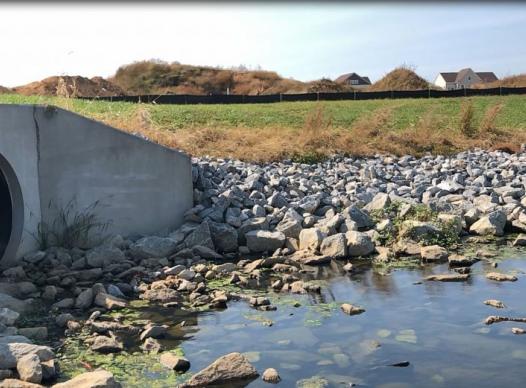The Stormwater Management Division (SWM) conducts routine inspections to identify potential stormwater pollutant sources and promote good behavior to prevent accidental discharges to the storm sewer system. Restaurants, landscapers, auto repair shops, and car washes are examples of commonly inspected businesses.

The storm drainage system is a network of pipes, open channels, and other structures that collect and transport stormwater runoff to the nearest stream or lake. Cobb County’s Extent of Service diagrams describe the components of the storm drainage system maintained by the County.

Stormwater detention and retention ponds are designed to hold stormwater during rain events. They benefit the community by slowly releasing water in a controlled manner to reduce flooding and improve water quality. Routine maintenance is required to keep these stormwater controls functioning properly.

Onsite stormwater management measures are required for all new development that creates 5,000 square feet or more of new or reformed impervious coverage. Land disturbance permits must be obtained through the Community Development Plan Review process prior to construction.

Local restaurants manage many issues such as dumpster areas, storage of fryer grease for recycling, and mop water from cleaning. Resources are available to help owners and employees prevent pollutants from impacting the storm sewer system. Information on proper cleaning and handling techniques as well as what to do in the event of an accidental spill is also available.

Auto repair shops manage a variety of issues such as leaking automotive fluids, solvents, cleaning compounds and large volume storage of oil. Find resources to prevent stormwater pollution and promote good housekeeping techniques.

Other than rain water, all other discharges are prohibited from entering the storm sewer system without prior approval from Cobb County. Car washes utilize a variety of cleaners, soaps, and solvents. It is imperative that these pollutants are prevented from entering storm drains or escaping to the surrounding environment.

Yard debris blown or dumped into local streams, drainage easements, and storm drains impact function of the storm sewer system, impairs water quality, and can cause blockages leading to flooding. These practices are prohibited. Learn how to prevent storm water pollution and protect the storm sewer system.

SWM inspectors conduct routine audits at local industries with an NPDES permit, identifying potential stormwater pollutant sources and offering guidance on how to prevent contaminates from leaving the property and impacting the water quality of local streams.
